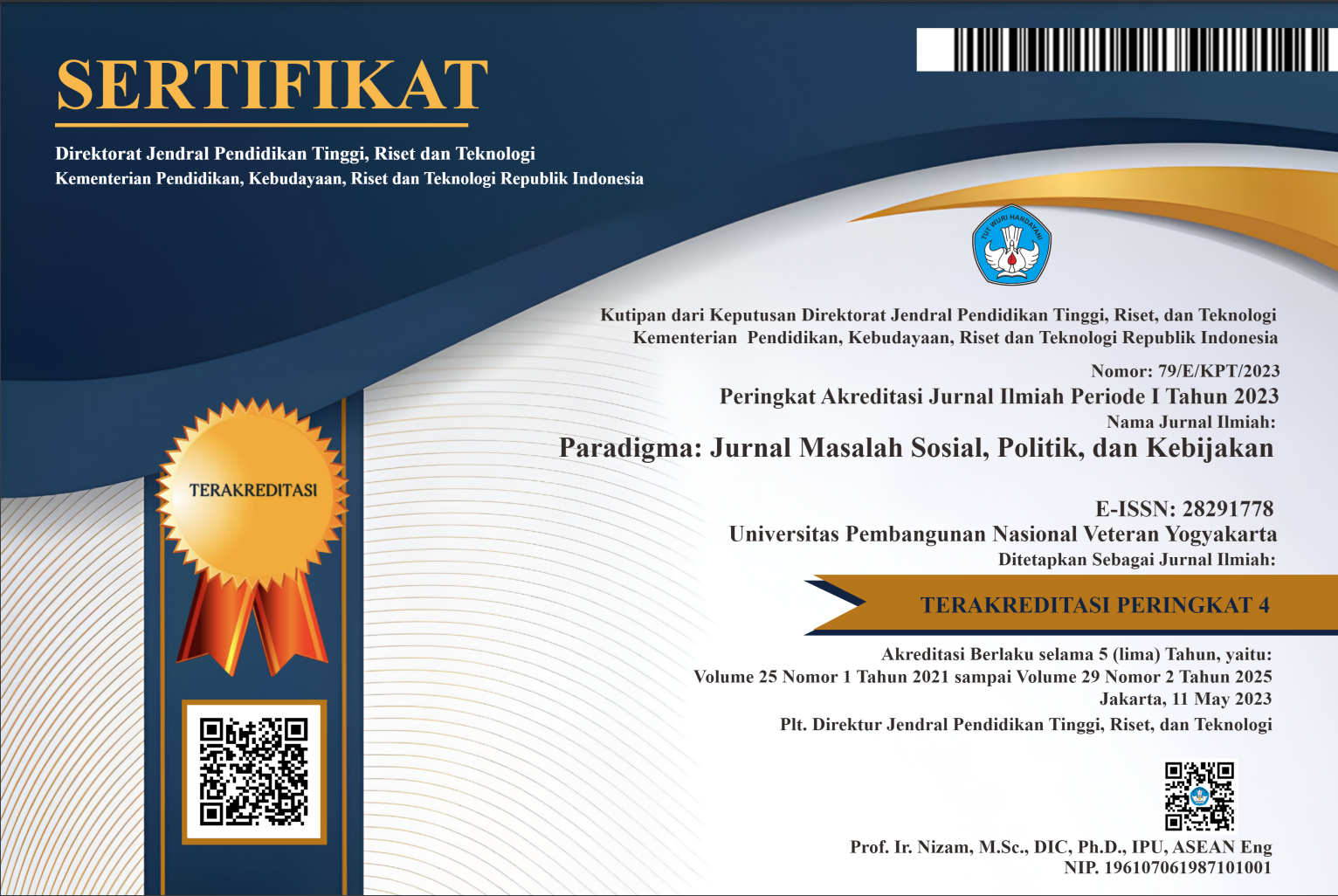KONFLIK UMAT HINDU - MUSLIM DI INDIA ERA PEMERINTAHAN NARENDRA MODI
Abstract
Abstract
The Hindu-Muslim conflict in India has been a systemic conflict in the last few decades. This communal conflict has increased since PM Narendra Modi from the Bharatiya Janata Party (BJP) hold power in 2014. To explain this problem this research uses the perspective of communalism Surya Prakash Upadhay and Rowena Robinson who state that Indian society is constructed based on lines of homogeneous religious identity. Economic, social and political interests are under religious identity. Communalism is used by the elite and politicians as an instrument to achieve their goal. The method used is a qualitative method with secondary data. The results of this study prove that the conflict between Hindu-Muslims in India is systemic because it is driven by Hindu nationalist interest groups such as the RSS which wants the construction of India based on Hindutva ideology. This conflict has become more massive as a result of religion being used by BJP politicians as an instrument or means to win sympathy for Hindus in India.
Keywods: conflict, Hindu Muslim, communalism, Bharatiya Janata Party, Rashtriya Swayamvevak Sangh
Keywords
Full Text:
PDF (Bahasa Indonesia)References
Daftar Pustaka
Anderson, Walter & Shridhar D. Damle. (2019). Messengers of Hindu nationalism: How the RSS reshaped India. South Asia: Journal of South Asian Studies, 45(5), 943–944. doi : https://doi.org/10.1080/00856401.2022.2067387
Buck, Jesse. (2017). The word’s best minority: Persis and hindutva’s ethnic nationalism in India. Ethnic and Racial Studies 40 (15), 2806-2828. doi: https://doi.org/10.1080/01419870.2016. 1259492.
Chandra, Bipan Chandra. (1984). Communalism in Modern India. New Delhi: Vani Educational Books.
Creswell, John W. 2018. Research Design: Pendekatan Kualitatif, Kuantitatif dan Campuran. Terjemahan oleh Achmad Fawaid dan Rianayati KP. Yogyakarta: Pustaka Pelajar.
Ellis, Hannah, Petersen and Ahmer Khan, “They cut him into pieces: India’s ‘love jihad’ conspiracy theory turns lethal,” https://www.theguardian.com/world/2022/jan/21/they-cut-him-into-pieces-indias-love-jihad-conspiracy-theory-turns-lethal.
Frydenlund, Oselin and Eviane Leidig. (2022). Love jihad : Sexuality, reproduction and the construction of the predatory muslim male. Religious, 13 (201). doi: doi.org./10.3390/rel13030201. Dalam https://www.mdpi.com/journal /religions.
Human Rights Watch. (2019). Violent Cow Protection in India: Vigilante Groups Attack Minorities. Diunduh dari https://www.hrw.org/report/2019/02/19/violent-cow-protection-india/vigilante-groups-attack-minorities.
_________________________. (2022). India: Surge in Summary Punishments of Muslims. Diunduh dari https://www.hrw.org/news/2022/10/07/india-surge-summary-punishments-muslims.
Hargrave Jr., Robert L. Jr. dan Stanley A. Kachoneck. (1993). India: Government and Politics in a Developing Nation. Texas : Harcourt Brace Javanovich.
Iwanek, Krzystof. (2016). Love jihad and the streotipes of muslims in Hindu nationalism. Journal of Alternative Prespective in the Social Science, 7 (3): 355-359.
Juergenmayer, Mark. (1993). Menentang Negara Sekuler: Kebangkitan Nasionalisme Agama. Terjemahan oleh Noorhadi. Jakarta: Mizan, Jakarta.
Liliweri, Alo. (2005). Prasangka dan Konflik: Komunikasi Lintas Budaya Masyarakat Multikultur. Yogyakarta: LKiS.
Mashad, Dhororudin. (1998). Agama dalam Kemelut Politik : Dilema Sekularisme India, Jakarta: CIDES.
MS, Eeshanpriya & Shubhangi Khapre.(…). With BJP leaders in attendance, Hindu outfits hold rallies on ‘love jihad’, ‘forced conversion’. Diunduh dari https://indianexpress.com/article/cities/mumbai/mumbai-hundreds-march-love-jihad-laws-religious-conversion-8411289/
NPR (2019), “The powerful group shaping the rise of Hindu nationalism in India,” https://www.npr.org/2019/05/03/706808616/the-powerful-group-shaping-the-rise-of-hindu-nationalism-in-india.
Pruitt, Deang G dan Jeffrey Z. Rubin (2004). Teori Konflik Sosial (Diterjemahkan oleh Helly P. Soejipto dan Sri Mulyani P). Yogyakarta: Pustaka Pelajar.
The British Broadcasting Corporation (BBC). (2019, 24 May). India General Election. Diunduh dati https://www.bbc.com/news/world-asia-india-48366944.
The Guardian. (2022, 20 September). What is Hindu nationalism and how does it relate to trouble in Leicester? Hindutva is the predominant form in India and has been associated with rightwing extremism. Diunduh dari https://www.theguardian.com/world/2022/sep/20/what-is-hindu-nationalism-and-who-are-the-rss..
The Indian Express (2023, ). ‘Anti-love jihad’ organisation to hold meet in Mumbai today. Diunduh dari https://indianexpress.com/article/cities/mumbai/anti-love-jihad-organisation-to-hold-meet-in-mumbai-today-8424491.
The World Bank. (2023). Population, total – India. Diunduh dari https://data.worldbank.org/indicator/SP.POP.TOTL?locations=IN
Rahman, Khalid. (2017). Indian secularism and religious minorities: The case of muslims,” Policy Perspektives, 14 (2): 35-53. doi: 10.13169.
Ramachandran. Sudha. (2020). Hindutva violence in India: Trends and implications. Counter Terrorist Trends and Analyses, 12 (4): 15-20.
Ravindra, Rudy. (2014). International Policy Digest. 1 (5): 55-58.
Upadhyay, Surya Prakash & Robinson, Rowena. (2012, 8 September). Revisiting communalism and fundamentalism in India. Economic and Political Weekly, 47 (36): 35-57.
Sajjad, Muhammad Waqas. (2018). Examining the state of muslm minority under Modi’s BJP since 2014, Strategic Studies, 38 (4): 19-36.
Soe, Hyeon Jae. (2017). Equal but not separate: India's secular dilemma equal but not separate: India's secular, Harvard International Review, Cambridge, 38 (4): 42-45.
Sonia, Bhalotra, Irma Clots, Lakshmi Iyer. (2012). “Politician identity and religious conflict in India. Diunduh dari https://www.theigc.org/sites/default/files/2014/10/Bhalotra-et-al-2012-Working-Paper.pdf.
Thobani, Sitara. (2019). Alt- right with the Hindu-right: Long distance nationalism and the pervection of hindutva, Ethnic and Racial Studies, 42 (5): 745-762. doi: doi.org/10.1080/01419870.2018.1458567.
Waikar, Prashant. (2018). Reading islamphobia in hindutva: An analysis of Narendra Modi’s political discourse, Islamphobia Studies Journal, 4 (2): 161.180.
DOI: https://doi.org/10.31315/paradigma.v27i2.9808
Refbacks
- There are currently no refbacks.
Copyright (c) 2023 Bastian - Yunariono

This work is licensed under a Creative Commons Attribution-ShareAlike 4.0 International License.
Paradigma: Jurnal Masalah Sosial, Politik, dan Kebijakan
Published by Faculty of Social Science and Political Science
Universitas Pembangunan Nasional "Veteran" Yogyakarta
(Kampus Unit II) Jl. Babarsari 2, Tambakbayan, Depok, Yogyakarta 55281
Phone: +62 274 486733. Email: paradigma@upnyk.ac.id

This work is licensed under a Creative Commons Attribution-ShareAlike 4.0 International License.



